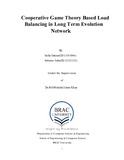| dc.contributor.author | Intesar, Sadia | |
| dc.contributor.author | Saha, Subarno | |
| dc.date.accessioned | 2016-01-20T12:14:47Z | |
| dc.date.available | 2016-01-20T12:14:47Z | |
| dc.date.issued | 2015-12 | |
| dc.identifier.other | ID 11101064 | |
| dc.identifier.other | ID 12121132 | |
| dc.identifier.uri | http://hdl.handle.net/10361/4901 | |
| dc.description | This thesis report is submitted in partial fulfillment of the requirements for the degree of Bachelor of Science in Computer Science and Engineering, 2015. | en_US |
| dc.description.abstract | Long term evolution (LTE) network, incompatible with 2G and 3G networks is the most
promising technology for wireless communication with higher speed and capacity. Selforganized
load balancing is an important research issue for the wireless networks. Game theory
provides an efficient way to provide self-organizing properties in a distributed environment like
LTE networks. Load balancing means to assign users from highly loaded cells to neighbor lower
loaded cells. The amount of load needs to be offloaded or accepted by a particular cell is not
really specified and currently totally vendor specified. In our proposed cooperative game
theoretic approach, each cell is considered as a player where they trade the load by forming a
coalition by satisfying the overall performance of the network. Simulation results show that our
proposed method provides better performance in terms of satisfied users and adjusted load
values. | en_US |
| dc.language.iso | en | en_US |
| dc.publisher | BRAC University | en_US |
| dc.subject | Computer science and engineering | en_US |
| dc.subject | Long term evolution (LTE) | en_US |
| dc.title | Cooperative game theory based load balancing in long term evolution network | en_US |
| dc.type | Thesis | en_US |

